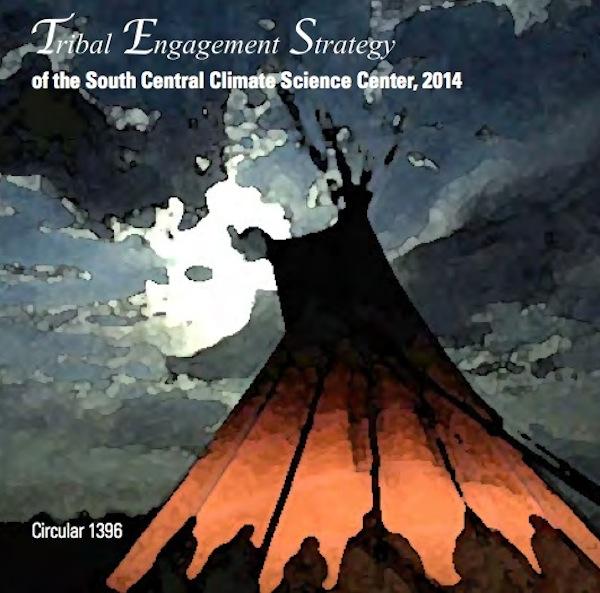
The cover of the new circular on engaging with tribes on climate change, released by the U.S. Geological Survey.
Indian Country Today, 9/29/14
Many U.S. government agencies of late—from the President’s office on down—have been touting the value and necessity of working with tribes on matters of climate change.
Now the U.S. Geological Survey has boarded that train with a newly released a 36-page Tribal Engagement Strategy designed to both address tribal concerns and tap Native expertise when it comes to mitigating and adapting to climate change. This is partly because Indigenous Peoples are known to be on the front lines of the battle, and is also a recognition that traditional knowledge knows many things that science is only now discovering.
RELATED: Southwest Tribes Struggle With Climate Change Fallout
“Collaboration between federal Climate Science Centers, partner agencies and tribes is vital for minimizing and adapting to potential harmful effects of climate change on human society and surrounding ecosystems,” the USGS said in a statement releasing the report, a 36-page circular titled “Tribal Engagement Strategy of the South Central Climate Science Center, 2014.”
The USGS, part of the U.S. Department of the Interior, oversees several Climate Science Centers around the country that were created between 2010 and 2012. Now Interior is looking to increase that engagement, acknowledging that “collaboration between federal Climate Science Centers, partner agencies and tribes is vital for minimizing and adapting to potential harmful effects of climate change on human society and surrounding ecosystems,” as the USGS put it in a September 25 statement.
RELATED: Interior Seeks Tribal Members to Serve on Climate Change Committee
“All eight of our Climate Science Centers are working closely with tribal nations to develop the practical science they need,” said Anne Castle, Assistant Secretary for Water and Science, for the U.S. Department of the Interior, in a USGS statement. “We are looking forward to the addition of five new BIA tribal liaison positions within the CSC network to help bring climate science results directly to tribal governments.”
The South Central CSC assists tribes in assessing their vulnerabilities and developing strategies to cope, the USGS said. The new circular highlights funding opportunities and other resources and contacts to help.
“It is our intent to share climate change mitigation and adaptation information with tribes and to receive feedback from tribal members regarding how ecosystems and cultural resources can be maintained as climate changes,” said Kim Winton, USGS scientist and director of the South Central Climate Science Center, in the statement.
The circular homes in on the issues affecting the 68 tribes that are based in the south-central United States, highlighting programs and initiatives, and fostering communication between the USGS and American Indians in the region.
“Through two-way communication of interests, knowledge and concern about climate change and related issues, the needs of tribes in the south central United States will be better served, and interpretation of the effects of climate change in this region will be strengthened,” Winton said.
Read more at http://indiancountrytodaymedianetwork.com/2014/09/29/us-geological-survey-releases-tribal-engagement-policy-157115
